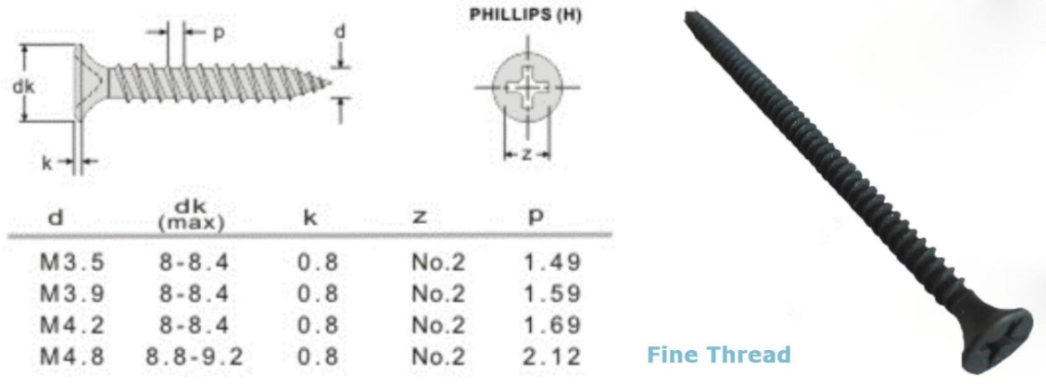recommended drywall screw length companies
The Importance of Choosing the Right Drywall Screw Length
When it comes to drywall installation, selecting the proper materials is crucial for ensuring quality and durability. Among these materials, drywall screws play a pivotal role. They secure the drywall sheets to the framing and create a smooth surface for finishing. However, one of the most common mistakes made during installation is choosing the wrong length of drywall screws. This article will delve into how to determine the recommended drywall screw length and why it's essential for a successful drywall project.
Understanding Drywall Thickness
Before selecting the appropriate screw length, it is vital to understand the thickness of the drywall you are working with. Standard drywall sheets typically come in thicknesses of 1/4 inch, 1/2 inch, and 5/8 inch. Each thickness requires different screw lengths to ensure proper anchorage to the studs or joists behind the drywall.
- For 1/4-inch drywall, 1-inch screws are usually recommended. - For 1/2-inch drywall, 1 1/4-inch screws are ideal. - For 5/8-inch drywall, 1 5/8-inch screws should be used.
Using screws that are too short can lead to insufficient hold, risking the drywall pulling away from the framing over time. On the other hand, screws that are excessively long may penetrate too deeply, potentially damaging plumbing, electrical wiring, or other materials behind the wall.
Types of Drywall Screws
There are various types of drywall screws available, and each type is designed for specific applications. The most commonly used screws are coarse-thread and fine-thread.
- Coarse-thread drywall screws These are ideal when securing to wooden studs. They grip well into the softer wood, providing a more secure hold. - Fine-thread drywall screws These are designed for metal studs. The finer threads allow for better engagement with the metal, providing a secure attachment.
In addition to the thread types, drywall screws come in different finishes, such as phosphate-coated, which helps resist rust and corrosion. Choosing the right type of screw is essential in conjunction with the correct length to ensure a strong hold.
recommended drywall screw length companies

How to Measure for Screw Length
When determining the screw length needed for your project, it’s essential to consider both the drywall thickness and the type of framing. For most applications, the screw should penetrate the framing material by at least 5/8 inch to ensure a solid hold. A general rule of thumb is that the total length of the screw should equal the thickness of the drywall plus the minimum penetration into the framing.
For example, if you are installing 1/2-inch drywall over wooden studs, the screw length should be approximately 1 1/4 inches (1/2 inch for the drywall plus 3/4 inch to reach the wood).
Why Screw Length Matters
Choosing the correct screw length is not merely a matter of preference; it has significant implications for the structural integrity of the installed drywall. Short screws may result in a poorly anchored wall that can sag or shift, leading to cracks or even larger issues requiring repairs. Conversely, over-penetration can damage internal structures, leading to costly renovations and safety hazards.
Additionally, using the recommended screw length will ensure the screws do not break during installation, making the process smoother and reducing the need for additional repairs later.
Recommendations from Industry Professionals
Many drywall installation professionals recommend always having a range of screw lengths on hand. It’s a practical approach when dealing with various drywall thicknesses or coping with framing inconsistencies. Additionally, consider the specific needs of your project, such as moisture-resistant drywall or soundproofing materials, which might require specialized screws.
Conclusion
Selecting the appropriate drywall screw length is a crucial step in drywall installation that directly influences the durability and quality of the finished project. By understanding the different drywall thicknesses and screw types available, you can make informed choices that lead to successful installations. Remember, investing the time upfront to choose the right screws will save you time and money in repairs and maintenance down the line. Always prioritize quality materials and follow industry guidelines for optimal results.
-
Top Choices for Plasterboard FixingNewsDec.26,2024
-
The Versatility of Specialty WashersNewsDec.26,2024
-
Secure Your ProjectsNewsDec.26,2024
-
Essential Screws for Chipboard Flooring ProjectsNewsDec.26,2024
-
Choosing the Right Drywall ScrewsNewsDec.26,2024
-
Black Phosphate Screws for Superior PerformanceNewsDec.26,2024
-
The Versatile Choice of Nylon Flat Washers for Your NeedsNewsDec.18,2024










